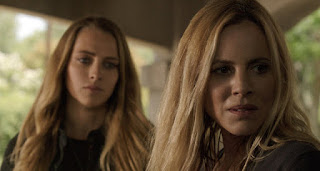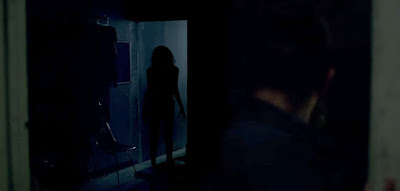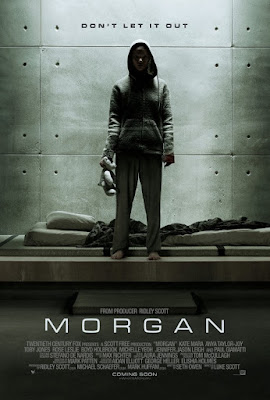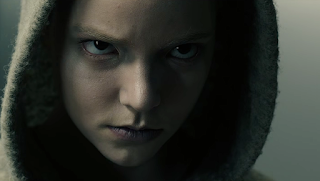MILES AHEAD
(US - 2016)
For years, Don Cheadle has been talking about his wish to make a film about jazz legend Miles Davis. He finally got the chance with this partially crowd-funded indie that also marks his debut as a writer and director. For something that he had bouncing around in his head all these years, MILES AHEAD is an almost total missed opportunity. Cheadle wanted to avoid the pratfalls of a standard-issue biopic, which is commendable, but he more or less just drops a character named "Miles Davis" into a rote buddy movie with occasional car chases and action sequences. Set primarily during Davis' reclusive late 1970s period of self-imposed exile in his Upper West Side NYC apartment, MILES AHEAD pairs him with a fictional Rolling Stone journalist named Dave Braden (Ewan McGregor), who's desperate to grab an exclusive with him. Davis is currently butting heads with Columbia Records execs who have been waiting several years for his latest record. Columbia A&R douchebag Harper Hamilton (a reptilian Michael Stuhlbarg) and his Davis-like, Next Big Thing signing Junior (LaKeith Lee Stanfield) steal the sole copy of Davis' latest recording, prompting the embittered, burned-out, drug-addled trumpeter and his befuddled sidekick Braden to turn NYC (actually, Cincinnati, where this was shot) upside-down in pursuit of it. All the while, Davis periodically reflects on his career triumphs (and, of course, sees himself in the young ingenue Junior) and his failed marriage to dancer Frances (Emayatzy Coridealdi), pondering Where It All Went Wrong.
ELVIS & NIXON
(US - 2016)
Elvis Presley and President Richard Nixon had a meeting in the Oval Office on December 21, 1970, with the resulting photo of the two cited as the most requested in the National Archives. ELVIS & NIXON purports to tell "the true story" of what went down at that secret meeting. Troubled by the direction of Vietnam-era youth--their malaise, their drug use, their music--Elvis is obsessed with the idea of working undercover for the Federal Narcotics Bureau as a "Federal Agent-at-Large," and requests a meeting with Nixon to make it happen. This story was covered before in Allan Arkush's little-seen 1997 cable movie ELVIS MEETS NIXON, with Rick Peters as Elvis and Bob Gunton as Nixon, but ELVIS & NIXON, co-written by actor Cary Elwes and directed by Liza Johnson (HATESHIP LOVESHIP), has two bigger names onboard, with Michael Shannon as Elvis and Kevin Spacey as Nixon. These are brilliant actors, and while neither does an SNL caricature, Spacey does a good job of nailing Nixon's mannerisms in the face of Elvis' increasingly absurd behavior, like an impromptu karate demonstration near the end of their afternoon together. Nixon sees being an Elvis pal as a way of appealing to America's youth, and while he's initially dismissive of the idea, the meeting puts a spring in Nixon's step--watch the way he enthusiastically asks aides Egil Krogh (Colin Hanks) and Dwight Chapin (Evan Peters) "Am I Mr. Cool?"--and Spacey does a very nice job with it. Shannon is a versatile actor but he just can't pull off Elvis. It makes sense that he wants to play Elvis as a person rather than the "Elvis" of his public image, but he never comes off as anything but Michael Shannon in an Elvis costume. He meets two impersonators early on and they demonstrate more life than he does. Shannon's Elvis is among the most quiet and soft-spoken in pop culture. It would've helped a little to maybe sound or act like him--Shannon is about as plausible an Elvis as Chevy Chase was a Gerald Ford. While Spacey doesn't cartoonishly mimic Nixon, he at least conveys a Nixonian presence. Shannon seems like an Elvis impersonator who's off the clock but still hasn't changed into his own clothes. And who cares about his buddy Jerry Schilling (Alex Pettyfer) who's preoccupied with getting back to Hollywood to propose to his girlfriend (Sky Ferreira)? The closing credits roll at 80 minutes and they still have to pad the running time with a subplot about Jerry and his girlfriend? Also featuring Johnny Knoxville for some reason, ELVIS & NIXON finds some genuine laughs in the very late-going, but for the most part, it's low-key to the point of catatonia, never recovering from a miscast Shannon's inert (though some critics really liked it) interpretation of the King. If you want an Elvis performance that's funny and heartfelt and relatively real, stick with Bruce Campbell in BUBBA HO-TEP. (R, 86 mins)
(Italy/UK - 2016)
From the 1960s through the 1980s, it was common to find Hollywood actors who were aging or in a career slump slumming in B-grade European knockoffs of popular American movies. To that end, there's a brief sense of nostalgia to be enjoyed with ANDRON, an incoherent Italian ripoff of THE HUNGER GAMES and THE MAZE RUNNER that somehow prominently features a visibly inconvenienced Alec Baldwin as Adam, the nefarious master of--wait for it--"The Redemption Games." It's some survival game being broadcast to a post-apocalyptic, dystopian society in the year 2154, years after "The Big Catastrophe" nuked the planet, killing billions of people and leading to The Nine Corporations assuming control of the world. Ten strangers wake up to find themselves forced contestants in The Redemption Games, which is being beamed to members of an enslaved society who have placed bets where the winners earn their freedom. You expect to see Danny Glover in something like this--he plays "The Chancellor," some Nine Corporations leader--but isn't this a little beneath Alec Baldwin? Sure, hosting a rebooted MATCH GAME is probably a fun lark, but how exactly did this script get to him? Did he see an easy payday and assumed the resulting mess would never be released? ANDRON was filmed in 2014, around the same time Baldwin had a supporting role in the fifth entry in Santiago Segura's popular Spanish-made TORRENTE action/comedy franchise, TORRENTE 5: OPERACION EUROVEGAS (the first was made in 1998 and they've turned up streaming on Amazon), so he likely did the Malta-shot ANDRON on the same trip to Europe. But why? His appearances throughout are almost Bruce Willisian in their laziness and disconnect from the rest of the movie (the DVD's making-of shows a VFX shot of Baldwin's head being CGI'd onto a stand-in's body for a scene where his character appears with Glover). He probably didn't spend any more than a day or two on the set, probably coming off like a mercurial prick at least once and maybe trying to lighten the mood by entertaining the crew by dropping some GLENGARRY GLEN ROSS bon mots or the MALICE "I am God" speech. His role primarily consists of sitting at a desk, watching The Redemption Games on a hologram and occasionally engaging in some MINORITY REPORT pantomiming as he manipulates and moves things around on a holographic screen. When the first contestant is killed, a smirking Baldwin purrs "Ten little Indians standing in a line, one toddled home and then there were nine." Other observational witticisms from behind his desk include:
- "Now things get interesting."
- "Let's liven things up a little."
- "Let's give them something else to think about."
- "That's my girl."
- "Welcome back my friends, to the show that never ends!"
- "Let's shuffle this deck."
- "What the hell is that?"
- "Get them back on the grid!"
- "Shit!"
Written and directed by Francesco Cinquemani, ANDRON is so muddled and incomprehensible that it feels like you're watching the fourth or fifth installment in a franchise where the previous installments were never made. Opening in medias res is one thing, but not knowing who anyone is or what's going on or why we should even care makes for a frustrating experience. Never mind the atrocious CGI and greenscreen work--it seems entirely possible that Baldwin is completely unaware of this film and his appearance in it is actually a CGI hologram--the story isn't even remotely engaging and what little you can figure out is blatantly and shamelessly cribbed from THE HUNGER GAMES, THE MAZE RUNNER, and even the cult classic CUBE. The nominal lead is Leo Howard, the star of the Disney Channel's KICKIN' IT, and Skunk Anansie vocalist Skin plays a Milla Jovovich-like badass who's been implanted with someone's memories or some such nonsense. ANDRON is a complete botch that has the audacity to leave the door open for a sequel, and if Z-grade '70s hack Alfonso Brescia/"Al Bradley" was still alive and making Italian ripoffs, he probably would've made this. As it is, it's hopefully as close to an Uwe Boll joint as Baldwin will ever get. Did he owe Stephen a favor and do this movie for him? Did Mitch & Murray send him to Malta on a mission of mercy? (R, 96 mins)








































































